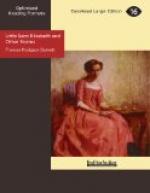The proud grain, which must be called a blade now, had plenty of change and company after this. It grew taller and taller every day, and made a great many new acquaintances as the weather grew warmer. These were little gold and green beetles living near it, who often passed it, and now and then stopped to talk a little about their children and their journeys under the soil. Birds dropped down from the sky sometimes to gossip and twitter of the nests they were building in the apple-trees, and the new songs they were learning to sing.
Once, on a very warm day, a great golden butterfly, floating by on his large lovely wings, fluttered down softly and lit on the proud blade, who felt so much prouder when he did it that she trembled for joy.
“He admires me more than all the rest in the field, you see,” it said, haughtily. “That is because I am so green.”
“If I were you,” said the learned blade, in its modest way, “I believe I would not talk so much about being green. People will make such ill-natured remarks when one speaks often of one’s self.”
“I am above such people,” said the proud blade “I can find nothing more interesting to talk of than myself.”
As time went on, it was delighted to find that it grew taller than any other blade in the field, and threw out other blades; and at last there grew out at the top of its stalk ever so many plump, new little grains, all fitting closely together, and wearing tight little green covers.
“Look at me!” it said then. “I am the queen of all the wheat. I have a crown.”
“No.” said its learned companion. “You are now an ear of wheat.”
And in a short time all the other stalks wore the same kind of crown, and it found out that the learned blade was right, and that it was only an ear, after all.
And now the weather had grown still warmer and the trees were covered with leaves, and the birds sang and built their nests in them and laid their little blue eggs, and in time, wonderful to relate, there came baby birds, that were always opening their mouths for food, and crying “peep, peep,” to their fathers and mothers. There were more butterflies floating about on their amber and purple wings, and the gold and green beetles were so busy they had no time to talk.
“Well!” said the proud ear of wheat (you remember it was an ear by this time) to its companion one day. “You see, you were right again. I am not so green as I was. I am turning yellow—but yellow is the colour of gold, and I don’t object to looking like gold.”
“You will soon be ripe,” said its friend.
“And what will happen then?”
“The reaping-machine will come and cut you down, and other strange things will happen.”
“There I make a stand,” said the proud ear, “I will not be cut down.”
But it was just as the wise ear said it would be. Not long after a reaping-machine was brought and driven back and forth in the fields, and down went all the wheat ears before the great knives. But it did not hurt the wheat, of course, and only the proud ear felt angry.




